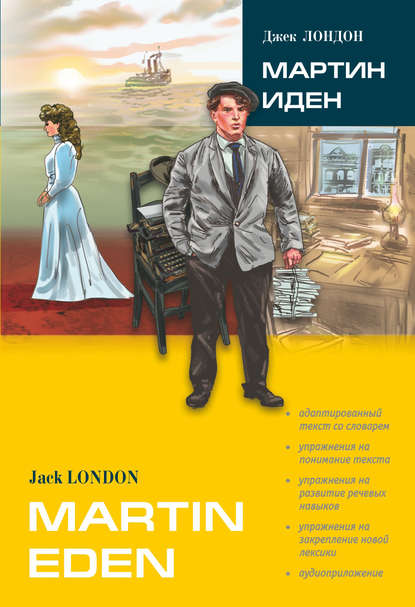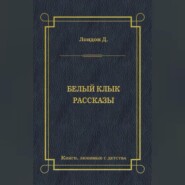По всем вопросам обращайтесь на: info@litportal.ru
(©) 2003-2024.
✖
Mrtin Eden / Мартин Иден (в сокращении). Книга для чтения на английском языке
Настройки чтения
Размер шрифта
Высота строк
Поля
He read much poetry, finding his greatest joy in the simpler poets, who were more understandable. He loved beauty, and there he found beauty. Poetry, like music, stirred him profoundly; and though he did not know it, he was preparing his mind for the heavier work that would come later.
The man at the desk in the library had seen Martin there so often that he had become quite pleasant, always greeting him with a smile and a nod when he entered.
One day Martin blurted out:
“Say, there’s something I’d like to ask you.”
The man smiled and paid attention.
“When you meet a young lady an’ she asks you to call, how soon can you call?”
“Why, I’d say any time,” the man answered.
“What is the best time to call? The afternoon – not too close to meal-time? Or the evening? Or Sunday?”
“I’ll tell you,” the librarian said, with a brightening face. “You call her up on the telephone and find out.”
“I’ll do it,” he said, picking up his books and starting away.
He turned back and asked: “When you’re speakin’ to a young lady – say, for instance, Miss Lizzie Smith – do you say ‘Miss Lizzie’ or ‘Miss Smith?’”
“Say ‘Miss Smith,’” the librarian stated authoritatively. “Say ‘Miss Smith’ always – until you know her better.”
So it was that Martin Eden solved the problem.
“Come down any time; I’ll be at home all afternoon,” was Ruth’s reply over the telephone to his stammered request as to when he could return the books she had given him.
She met him at the door herself, and her woman’s eye took in immediately the creased trousers, and the slight, but indefinable, change in him for the better.
Once they were seated in the drawing-room, he began to get on easily. She made it easy for him. They talked first of the borrowed books; she led the conversation on from subject to subject, while she pondered the problem of how she could help him. She had thought of this often since their first meeting. She wanted to help him.
“I wonder if I can get some advice from you”, he said. “You remember the other time I was here I said I couldn’t talk about books and things because I didn’t know how? Well, I’ve ben doin’ a lot of thinkin’ ever since.I’ve ben to the library a whole lot, but most of the books I’ve tackled have ben over my head. Mebbe I’d better begin at the beginnin’. I’ve worked pretty hard ever since I was a kid, an’ since I’ve ben to the library, lookin’ with new eyes at books – an’ lookin’ at new books, too – I’ve concluded that I ain’t ben reading the right kind. But I ain’t got to the point yet. Here it is: I want to make my way to the kind of life you have in this house. Now, how am I goin’ to get it? Where do I begin? I’m willin’ to work. Once I get started, I’ll work night an’ day. Mebbe you think it’s funny, me askin’ you about all this. I know you’re the last person in the world I ought to ask, but I don’t know anybody else I could ask…”
His voice died away. He feared he had made a fool of himself. Ruth did not speak immediately. Her face was all sympathy when she did speak.
“What you need you realize yourself, and it is education. You should go back and finish grammar-school, and then go through the high school and University.”
“But that takes money,” he interrupted.
“Oh!” she cried, “I had not thought of that. But, then, you have relatives – somebody who could assist you?”
He shook his head.
“My father and mother are dead. I’ve two sisters – one married, an’ the other’ll get married soon, I suppose. Then I’ve a string of brothers – I’m the youngest – but they never helped nobody. The oldest died in India. Two are in South Africa now, an’ another’s on a whaling voyage, an’ one’s travellin’ with a circus – he does trapeze-work. An’ I guess I’m just like them. I’ve taken care of myself since I was eleven – that’s when my mother died. I’ve got to study by myself I guess, an’ what I want to know is where to begin.”
“I should say the first thing of all would be to get a grammar book. Your grammar is…” She had intended saying “awful,” but she amended it to, “is not particularly good.”
He flushed and sweated.
“I know I must talk a lot of slang an’ words you don’t understand. But, then, they’re only words I know… how to speak. I’ve got other words in my mind – picked ’emup from books – but I can’t pronounce ’em, so I don’t use ’em.”
“It isn’t what you say so much as how you say it. You don’t mind my being frank, do you? I don’t want to hurt you.”
“No, no!” he cried; while he secretly blessed her for her kindness. “Fire away; I’ve got to know, and I’d sooner know from you than anybody else.”
“Well, then, you say ‘You was’; it should be ‘You were.’ You say ‘I seen’ for ‘I saw.’ You use the double negative…”
“What’s the double negative?” he demanded, then added humbly: “You see, I don’t even understand your explanations.”
“I’m afraid I didn’t explain that,” she smiled. “A double negative is… let me see – well, you say, ‘Never helped nobody.’ ‘Never’ is a negative. ‘Nobody’ is another negative. It is a rule that two negatives make a positive. ‘Never helped nobody’ means that, not helping nobody, they must have helped somebody.”
“That’s pretty clear,” he said. “I never thought of it before, and I’ll never say it again.”
“You’ll find it all in the grammar book,” she went on. “There’s something else I noticed in your speech. You say ‘don’t’ when you shouldn’t. ‘Don’t’ is a contraction, and stands for two words. Do you know them?”
He thought a moment, then answered: “‘Do not.’”
She nodded her head, and said: “And you use ‘don’t’ when you mean ‘does not.’”
He was puzzled over this.
“Give me an illustration,” he asked.
“Well…” she thought a moment. “’It don’t do to be hasty.’ Change ‘don’t’ to ‘do not,’ and it reads, ‘It do not do to be hasty,’ which is wrong. It must jar on your ear.”
“Can’t say that it does,” he replied judicially.
“Why didn’t you say, ‘Can’t say that it do?’”
“That sounds wrong,” he said slowly. “As for the other, I guess my ear ain’t had the trainin’ yours has.”
“There is no such word as ‘ain’t,’” she said emphatically.
Martin flushed again,
“And you say ‘ben’ for ‘been,’” she continued; “‘I come’ for ‘I came’; and the way you chop your endings is something dreadful.”
“What do you mean?” He leaned forward, feeling that he ought to get down on his knees before so marvellous a mind. “How do I chop?”
“You don’t complete the endings. ‘A-n-d’ spells ‘and.’ You pronounce it ‘an.’ ‘I-n-g’ spells ‘ing.’ Sometimes you pronounce it ‘ing,’ and sometimes you leave off the ‘g.’ And then you slur by dropping initial letters and diphthongs. ‘T-h-e-m’ spells ‘them.’ You pronounce it – oh, well, it is not necessary to go over all of them. What you need is a grammar book. I’ll get one and show you how to begin.”
When she returned with the book she drew a chair near his and sat down beside him. She turned the pages of the grammar and their heads were inclined towards each other.
For the moment the great gulf that separated them was bridged. He had been caught up into the clouds and carried to her.
_______
Several weeks went by, during which Martin Eden studied the grammar book Ruth had given him, reviewed the books on etiquette, and read voraciously the books that caught his fancy.

















